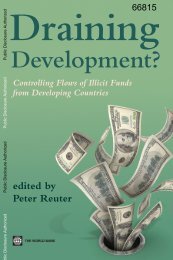International Trade in Services.pdf - DSpace at Khazar University
International Trade in Services.pdf - DSpace at Khazar University
International Trade in Services.pdf - DSpace at Khazar University
You also want an ePaper? Increase the reach of your titles
YUMPU automatically turns print PDFs into web optimized ePapers that Google loves.
68 <strong>Intern<strong>at</strong>ional</strong> <strong>Trade</strong> <strong>in</strong> <strong>Services</strong><br />
services <strong>in</strong> overseas loc<strong>at</strong>ions as clients expand abroad. Indeed, for many transactions,<br />
<strong>in</strong>tern<strong>at</strong>ional rules and regul<strong>at</strong>ions have become the core of the legal corpus,<br />
requir<strong>in</strong>g legal expertise th<strong>at</strong> goes well beyond the scope of domestic law. In<br />
this context, more open markets and gre<strong>at</strong>er <strong>in</strong>tern<strong>at</strong>ional <strong>in</strong>tegr<strong>at</strong>ion <strong>in</strong> legal<br />
services can br<strong>in</strong>g new expertise and best practice knowledge to a country and<br />
help professional bodies and educ<strong>at</strong>ional <strong>in</strong>stitutions adjust to the new challenges<br />
and opportunities th<strong>at</strong> they and their clients face <strong>in</strong> global markets.<br />
Open<strong>in</strong>g the market for legal services can also help overcome the resistance of<br />
vested <strong>in</strong>terests to changes <strong>in</strong>volv<strong>in</strong>g new practices. Interest groups <strong>in</strong> some countries<br />
may have pushed their governments to impose regul<strong>at</strong>ions on the legal profession<br />
th<strong>at</strong> are more restrictive than necessary to meet the legitim<strong>at</strong>e objectives of quality<br />
assurance and user protection.The outcome has often been a shortage of quality services<br />
and the concentr<strong>at</strong>ion of the profession’s output <strong>in</strong> the hands of a few. This regul<strong>at</strong>ory<br />
environment may therefore gener<strong>at</strong>e economic rents for vested <strong>in</strong>terests, while<br />
not necessarily contribut<strong>in</strong>g to the common good. In this context, trade can help<br />
<strong>in</strong>troduce gre<strong>at</strong>er competition, <strong>in</strong>duce domestic service providers to adopt new work<br />
methods and practices, and raise the efficiency of the provision of legal services.<br />
The employment impact of eas<strong>in</strong>g restrictions on market access and n<strong>at</strong>ional<br />
tre<strong>at</strong>ment depends on the importance of two factors. Serv<strong>in</strong>g mult<strong>in</strong><strong>at</strong>ional firms<br />
requires a different skill set than provid<strong>in</strong>g services to domestic clients. Given the<br />
scarcity of sufficiently qualified staff for <strong>in</strong>tern<strong>at</strong>ional legal work <strong>in</strong> host countries,<br />
newly implanted mult<strong>in</strong><strong>at</strong>ional firms will rely on their legal advisers <strong>at</strong> headquarters,<br />
and the result will be limited job and knowledge spillover to the host country.<br />
Altern<strong>at</strong>ively, economic <strong>in</strong>tegr<strong>at</strong>ion offers opportunities for domestic law firms to<br />
expand their practice areas and client base. For example, firms <strong>in</strong> develop<strong>in</strong>g and<br />
developed countries might engage <strong>in</strong> cooper<strong>at</strong>ive arrangements to handle host<br />
country, home country, third-country, and <strong>in</strong>tern<strong>at</strong>ional law <strong>in</strong> parallel. Ultim<strong>at</strong>ely,<br />
develop<strong>in</strong>g-country law firms might be able to go beyond serv<strong>in</strong>g domestically<br />
implanted mult<strong>in</strong><strong>at</strong>ional firms and move <strong>in</strong>to the export of legal services<br />
with<strong>in</strong> the region and beyond, thereby cre<strong>at</strong><strong>in</strong>g high value added jobs.<br />
In wh<strong>at</strong> follows, we synthesize background <strong>in</strong>form<strong>at</strong>ion on the legal profession<br />
and discuss policy <strong>in</strong>iti<strong>at</strong>ives th<strong>at</strong> decision makers <strong>in</strong>terested <strong>in</strong> develop<strong>in</strong>g the<br />
legal profession can undertake so as to improve regul<strong>at</strong>ory conditions domestically<br />
and promote potential export markets. The next section provides an<br />
overview of the legal profession and illustr<strong>at</strong>es the extent and benefits of the trade<br />
<strong>in</strong> legal services. Thereafter, we discuss <strong>in</strong>iti<strong>at</strong>ives to pursue a policy dialogue <strong>at</strong> the<br />
n<strong>at</strong>ional and regional levels designed to identify trade-rel<strong>at</strong>ed issues and constra<strong>in</strong>ts<br />
and potential policy <strong>in</strong>iti<strong>at</strong>ives to build professional value and improve<br />
market access abroad. F<strong>in</strong>ally, a conclud<strong>in</strong>g section conta<strong>in</strong>s a list of questions th<strong>at</strong><br />
stakeholders should bear <strong>in</strong> m<strong>in</strong>d as they advance reforms.

















